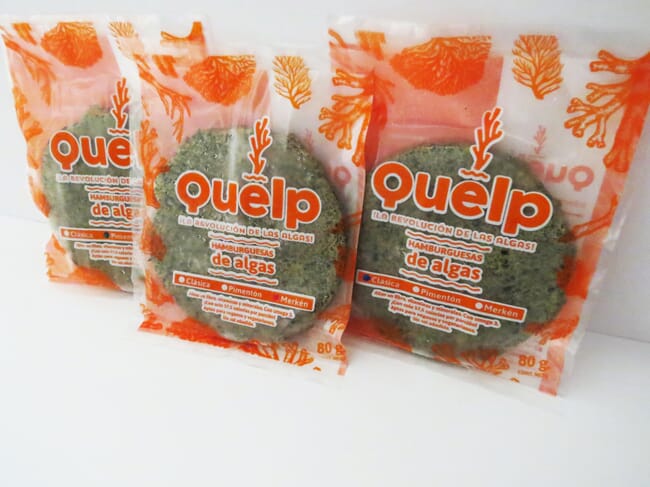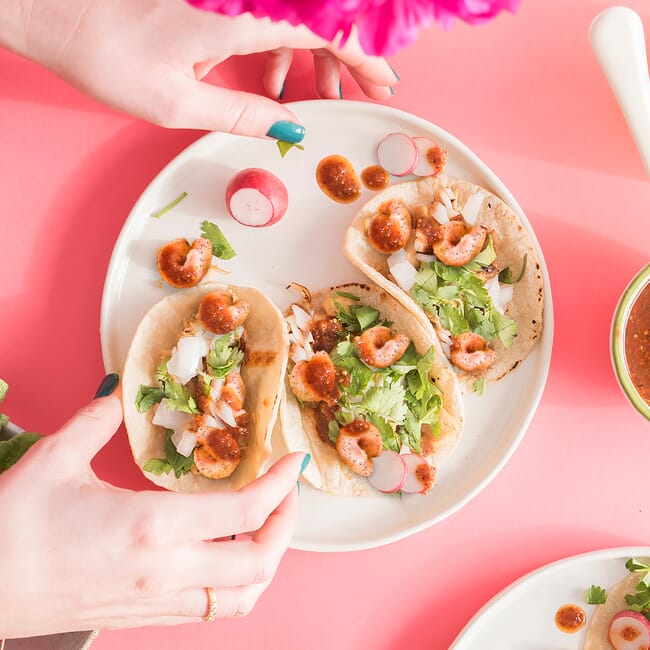Start-ups springing up across the sector tend to either cater to the growing number of people suffering from food allergies, or to those with ethical and environmental concerns about what they eat. Whatever the needs of these consumers, it’s a sector – largely driven by millennials – that is attracting considerable investment and generating a raft of innovative new products.

© New Wave Foods
Why seafood substitutes?
Globally, we are consuming more seafood. Data from the UK’s National Food Survey indicates that per capita consumption of fish is higher than it was a generation ago. This trend is expected to continue through 2030. Though seafood and shellfish are excellent sources of dietary protein, they have their drawbacks. Doctors usually tell the elderly, the infirm and pregnant women to avoid raw fish. In addition, seafood and shellfish are common food allergens – millions in the UK seek medical attention for allergic reactions every year. Research from allergyuk indicates that the prevalence of food allergies is increasing in the UK population. Seafood alternatives could present a popular dining option for consumers with restricted diets.
An additional concern with seafood and shellfish revolves around sustainable industry practices. Though efforts at environmental conservation have gained traction, overfishing, mercury contamination, bycatch, microplastics and ocean pollution are enduring issues.
There are sustainability and ethical concerns associated with farmed fish and shellfish as well. The International Labour Organisation has cited cases of child labour and unsafe working conditions in the sector. When it comes to sustainability, sourcing appropriate feeds, disease outbreaks and ensuring that waste is properly removed from the environment present significant challenges for the industry. Allowing consumers to embrace plant-based alternatives to seafood could side-step these concerns. Vegan and lab-grown seafood could present a new approach to conservation efforts. It also diminishes the economic incentive to intensively cultivate farmed species.
What’s out there now?
Currently, vegan seafood products are capitalising on the versatility of kelp and seaweed to form new products. GlobExplore’s fresh and salted seaweed was a finalist at the New Product Showcase at Seafood Expo North America, and Chilean company Quelp have developed a kelp-based burger that is both meat-free and coeliac friendly.

© Quelp
Other products use vegan ingredients to create substitute seafood that can be used in lieu of fish when cooking, or as a frozen/ready meal for convenience. Companies like Sophie’s Kitchen, Ocean Hugger Foods and New Wave Foods have all released vegan substitutes for tuna, shrimp and scallops. Sophie’s Kitchen uses pea protein and potato starch to create frozen fish fillets and now sells smoked salmon substitutes. New Wave’s “Raw” shrimp and Sophie’s Kitchen “Toona” are ready to use in home or restaurant cooking. Ocean Hugger’s Ahimi tuna substitute is even sold at sushi counters and had the reviewers at the Fast Company swearing that they would mistake it for tuna in a line-up. The companies have shifted away from the start-up phase and are available in multiple retail locations in the US.
A different approach to seafood substitutes uses tissue samples to grow fish cells in laboratory settings before selling it to consumers or diners in restaurants. Companies like Blue Nalu, Wild Type and Finless Foods have grown edible fish from small samples of fish cells. Finless Foods hopes to produce high-end bluefin tuna steaks with their method. Wild Type has produced smoked salmon, and is transitioning into growing salmon fillets. The cellular methods don’t harm the fish, so even if the production methods aren’t technically vegan, it certainly qualifies as “cruelty-free”, and could potentially be marketed as “clean meat”.
As of 2019, lab-grown fish is not commercially available – largely due to the costs associated with the growth medium. However, costs are rapidly reducing, so the commercialisation of these products could be years, and not decades, away.
Why now?
Current market research suggests that millennials are more likely to embrace vegetarianism and veganism than other demographics. According Forbes, millennials who made the switch cited environmental and ethical concerns as the primary motivation for changing their habits. As millennials become the prime consumers in the global economy, these trends could present new business opportunities as diets change. Marketing seafood alternatives or lab-grown fish as “cruelty-free”, “plant-based”, or “clean” directly appeals to this type of consumer.
The social media element of the vegan products shouldn’t be overlooked either. Ocean Hugger and New Wave Foods are marketing their products on different social media platforms; meaning that they will gain more traction with digital natives as their product portfolios expand.

© New Wave Foods
Additionally, vegan products – both the ready meals and the pantry items – tend to be marketed to women. According to research by Bridget Brennan at Forbes, women represent a multiplier effect when it comes to consumption. Women (still) tend to do the majority of the grocery shopping in the UK and in many cases are buying for the entire household. By strategically marketing these products to women, fish-free seafood may gain long-term traction and become a staple food item in the coming years.
As with many scientific and culinary innovations, the potential impact of fish-free seafood on the market remains to be seen. For the time being, lab-grown options are not commercially available and many of the vegan products are not priced competitively. Though Finless Foods’ method can be applied to any cut of any species of fish, they have positioned themselves in the luxury market instead of producing a grocery staple.
When considering the vegan options, a can of Sophie’s Kitchen Toona retails for £3.80, while Tesco branded tuna in brine costs £0.95. This price differential may keep the products from being immediately adopted by Western consumers. The sector’s impact on fisheries and aquaculture is undecided as well. Lab-grown fish is a potential avenue for ocean conservation. It could also reduce the incentive to intensively farm species. Time will tell if fish-free seafood becomes a significant disrupter to the world’s fisheries and aquaculture sectors.



